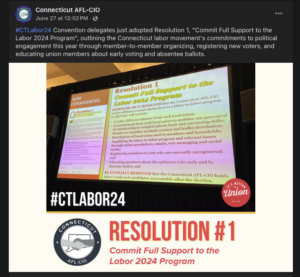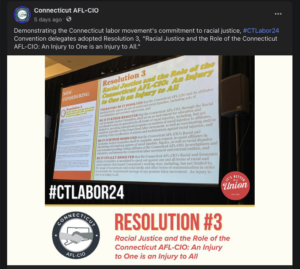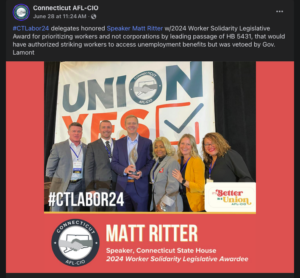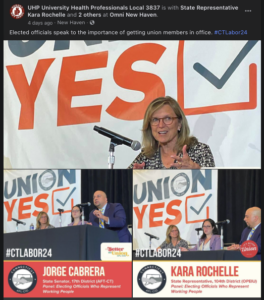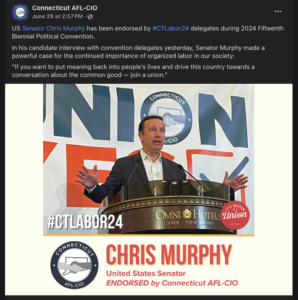With roughly four months till Election Day, the Connecticut AFL-CIO has endorsed a slew of candidates during its 15th biennial political convention held at the Omni New Haven Hotel from June 27-28.
Of the 88 endorsed candidates, 39 are either active, former, or retired union members, meaning slightly less than half have direct ties to the labor movement, potentially amplifying their influence in the upcoming election. This begs the question: What political favors will the union expect in exchange for their support?
During the convention’s opening remarks, CT AFL-CIO Executive Secretary Tiano Ocasio revealed as much, saying, “Our endorsement means more than other endorsement,” adding, “It means more because we put boots on the ground and work hard to ensure our endorsed candidates are elected.”
She vowed to hold candidates “accountable for their shortcomings and applaud them for the times they stood with us in our fight for justice.”
Strangely, AFL-CIO Secretary-Treasurer Shellye Davis has yet to receive an endorsement, even though she is running for State Senate in the 2nd District. Her pro-union agenda prioritizes dismantling the state’s 2017 bipartisan fiscal guardrails and increasing government intervention to benefit unions.
Speaking at the convention, Davis stated, “We have big challenges facing us in 2025 — We must tackle the fiscal guardrails that constrain our state budget and incentivize disinvestment in essential programs and services, and future generations. We will have to decide how to move forward on proposals that level the playing field for workers at the bargaining table and in the workplace.”
Apart from endorsing candidates, convention attendees also adopted new resolutions (all of which were shared on the CT AFL-CIO’s Facebook page). One such resolution “commit[s] full support to the ‘Labor 2024 Program’, outlining our priorities in political engagement this year.” This includes appointing a Labor 2024 coordinator from each local union and mandating local unions to mobilize one percent of their membership for phone banking and canvassing shifts to help their endorsed candidates.
Additionally, the resolution calls for member-to-member worksite contact and leaflet distribution, sending local union mail to members and households, and amplifying the labor-to-labor message through newsletters, emails, text messaging and social media. The program will also register unregistered members to vote and educate them about early and absentee voting options.
The resolution ends with a vague threat that the CT AFL-CIO “holds labor’s endorsed candidates accountable after the election,” adding to the concerns of a quid pro quo arrangement. It also appears that the “Labor 2024 Program” is more about securing political favors and prioritizing union demands over all else. This scheme will only lead to policies that serve a narrow group rather than the general population, thereby undermining the integrity of democratic processes and further eroding public trust in the government.
Hinting at possible internal issues within the union and its affiliates, another resolution was passed addressing racism in the workplace. It outlines the union’s commitment to addressing racial injustices including initiatives such as utilizing the Racial and Economic Justice Committee, promoting educational efforts and actively participating in movements against racial inequities.
The resolution specifies that the union’s Racial and Economic Justice Committee shall assist “affiliates in identifying and resolving matters of racial injustice, bigotry, as well as racial disputes and misunderstandings within affiliates of the Connecticut AFL-CIO, in workplaces and industries and between the Connecticut labor movement and external entities.”
The focus on internal education and conflict acknowledges that these issues may be present within the union’s own ranks, raising questions about the effectiveness and sincerity of its commitment to racial justice.
Also in attendance was Speaker of the House, Rep. Matt Ritter (D-Hartford) who was honored with the 2024 Worker Solidarity Legislative Award for “prioritizing workers and not corporations” by leading the passage of a controversial bill that would have forced taxpayers to pay workers who choose to go on strike, a policy that raises serious questions about fiscal responsibility and fairness.
The bill aimed to establish a “slush fund” within the Office of the State Comptroller (OSC) under the guise of support for “low-income” workers. In reality, these funds would have lined union members’ pockets for walking off their job. To make matters worse, there transparency and accountability concerns since the bill moved forward without public input or the usual legislative process. However, Gov. Ned Lamont ultimately vetoed the proposed ‘pay striking workers’ bill.
Other members of the General Assembly participated in a panel discussion titled “Electing Officials Who Represent Working People.” The panel emphasized the “importance of getting union members in office”. Former United Automobile Workers (UAW) boss, Sen. Julie Kushner (D-Danbury), applauded the “power of the workers” during bargaining negotiations since the “movement help[s] us to win things and we’re just there [as legislators] as the voice.”
Joining Sen. Kushner on the panel was American Federation of Teachers (AFT) organizer, Sen. Jorge Cabrera (D-Hamden), who emphasized the need for collective action, stating, “Whether it’s a political or economic system, one way to fight back and make sure our values are expressed in policy is to work together and fight to make sure we have the rights that we deserve on the job site.”
Rep. Kara Rochelle (D-Ansonia), another panel participant, echoed this sentiment, noting, “Politics can be draining but it’s important work,” adding, “Being grounded in working with people on that personal level [through organizing workers] is so important. You bring those stories back to your [legislative] colleagues and root policy in reality.”
Revealing that she also has union ties, Rochelle said, “The experience of being an organizer renews you for doing the work of policy work. The labor movement grounds you and motivates you for what you’re doing.”
These comments highlight the intimate relationship between unions and lawmakers, suggesting that the priorities of big labor significantly sway policy decisions, frequently to the detriment of the public.
Having received an endorsement from the AFL-CIO, U.S. Sen Chris Murphy (D-Conn) told delegates during his candidate interview that “if you want to put meaning back into people’s lives and drive this country towards a conversation about the common good — join a union.”
When asked about his stance on keeping Connecticut’s only public academic medical center — UConn Health — public amid rumors of privatization, Sen. Murphy made it clear that he is “open to any ideas [they] have,” and is “willing to use” his position of power to “side with the unions in this fight.”
Sen. Murphy then fired up the audience by urging them to “scream loud and consistently that one of the biggest mistakes this country has ever made is to allow so much of our healthcare system to get in the private sector.” This statement — met with a loud round of applause — seems to be typical pandering to union interests, potentially at the expense of public benefits and efficiency in the healthcare sector.
As we approach the 2024 elections, the Connecticut AFL-CIO’s recent political convention reveals big labor’s ever-growing influence on state policies. With numerous endorsements and ambitious resolutions, the union is clearly aiming to shape the political landscape with an agenda that prioritizes union interests over what is good for taxpayers and the state.

